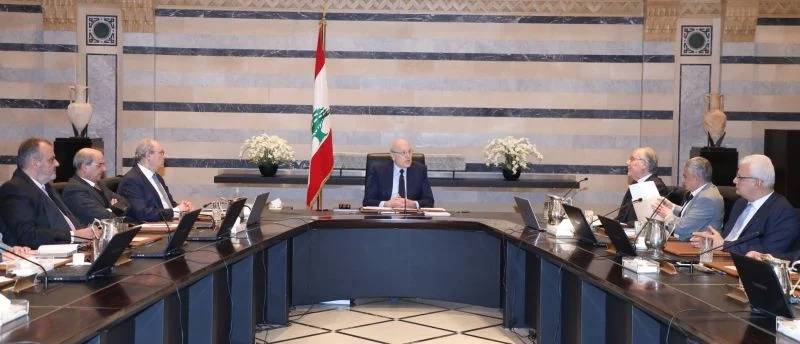
Caretaker cabinet meets, headed by Najib Mikati, Jan. 18, 2023. (Credit: Dalati and Nohra)
Want to get the Morning Brief by email? Click here to sign up.
Parliament is scheduled to convene for an 11th presidential election session today, its first of 2023. During previous attempts to mend the presidential vacuum in effect since Nov. 1, Parliament remained divided between a majority of blank votes (along with canceled ballots, including quips and write-ins for unlikely candidates) attributed to Hezbollah, the Free Patriotic Movements and their allies against votes for Zgharta MP Michel Moawad, who is supported by the Lebanese Forces (LF) and their allies. “The next parliamentary session for the presidential election will be similar to those that preceded it because the same logic prevails,” LF leader Samir Geagea said, accusing Parliament Speaker Nabih Berri of complicity in the deadlock. Berri has refused to hold an open voting session that wouldn’t lose quorum after the initial round of voting, as has repeatedly happened in the previous ten electoral sessions. This has prevented progress to a subsequent round of voting in which candidates can be elected with fewer ballots.
Cabinet yesterday approved $116 million in spending to mitigate the recent fuel shortages aggravating Lebanon’s electricity crisis. Caretaker Prime Minister Najib Mikati announced that $62 million will be used to purchase the cargo of two fuel ships docked off the Lebanese coast since December. The remainder of the funds will go towards maintenance works for Lebanon’s two largest power plants, Deir Ammar (North Lebanon) and Zahrani (South Lebanon), which were shut down for weeks due to hydrocarbon shortages. Cabinet, however, did not approve funding for fuel imports during the transitional period awaiting the collection of increased electricity tariffs. The body also refused to finance two additional fuel shipments intended for the Jiyyeh (Chouf) and Zouk Mosbeh (Kesrouan) power plants. Caretaker Energy Minister Walid Fayad, meanwhile, joined other Free Patriotic Movement-affiliated ministers in their boycott of the cabinet session, challenging the caretaker cabinet’s authority amid the country’s presidential vacancy. Mikati adjourned the session without addressing other issues on the agenda related to health and education, announcing that they would be handled during a future session.
Lead investigator in the Aug. 4, 2020 Beirut port blast probe Judge Tarek Bitar met with two visiting French judges who are investigating the deaths of two French citizens in the explosion. Bitar reportedly explained "the steps already taken by the Lebanese investigation and the obstacles he has faced for over a year" to the French magistrates but did not share any documents or details relating to the investigation — which would constitute a criminal offense while he is suspended from the case. The investigation has been paralyzed due to complaints filed against him by political figures implicated in the case. The hindrance of the investigation has been repeatedly criticized by blast victims’ relatives — some of whom blame caretaker Finance Minister Youssef Khalil for postponing the approval of judicial assignments that would reset the wheels in motion. A protest by victims’ relatives outside the Beirut Justice Palace last week led to judicial summonses for 13 activists on charges of rioting and vandalism. William Noun, whose brother was a Beirut Fire Brigade member killed while responding to the blast, was among those questioned and was briefly arrested.
Award-winning Lebanese film director Nadine Labaki; her husband, film producer Khaled Mouzannar; and production company Mooz Film are facing allegations of intellectual property violations and fraud following complaints by a Turkish director. Turkish director Andaç Haznedaroglu accused Labaki of plagiarism in a complaint filed last May, drawing similarities between the Turkish film Misafir (“The Guest”) and Labaki’s Cannes jury prize-winning Capernaum. According to the allegations, Haznedaroglu asked Labaki to take part in Misafir, but the Lebanese director refused. “The complaint is purely arbitrary. It came after Caparnaum’s international success for well-known purposes,” a representative of Labaki told L’Orient Today. Labaki countersued Haznedaroglu “for slander, insults and intimidation,” the representative added.
In case you missed it, here’s our must-read story from yesterday: “Lebanese digital nomads: Young, ambitious, global”
Compiled by Abbas Mahfouz